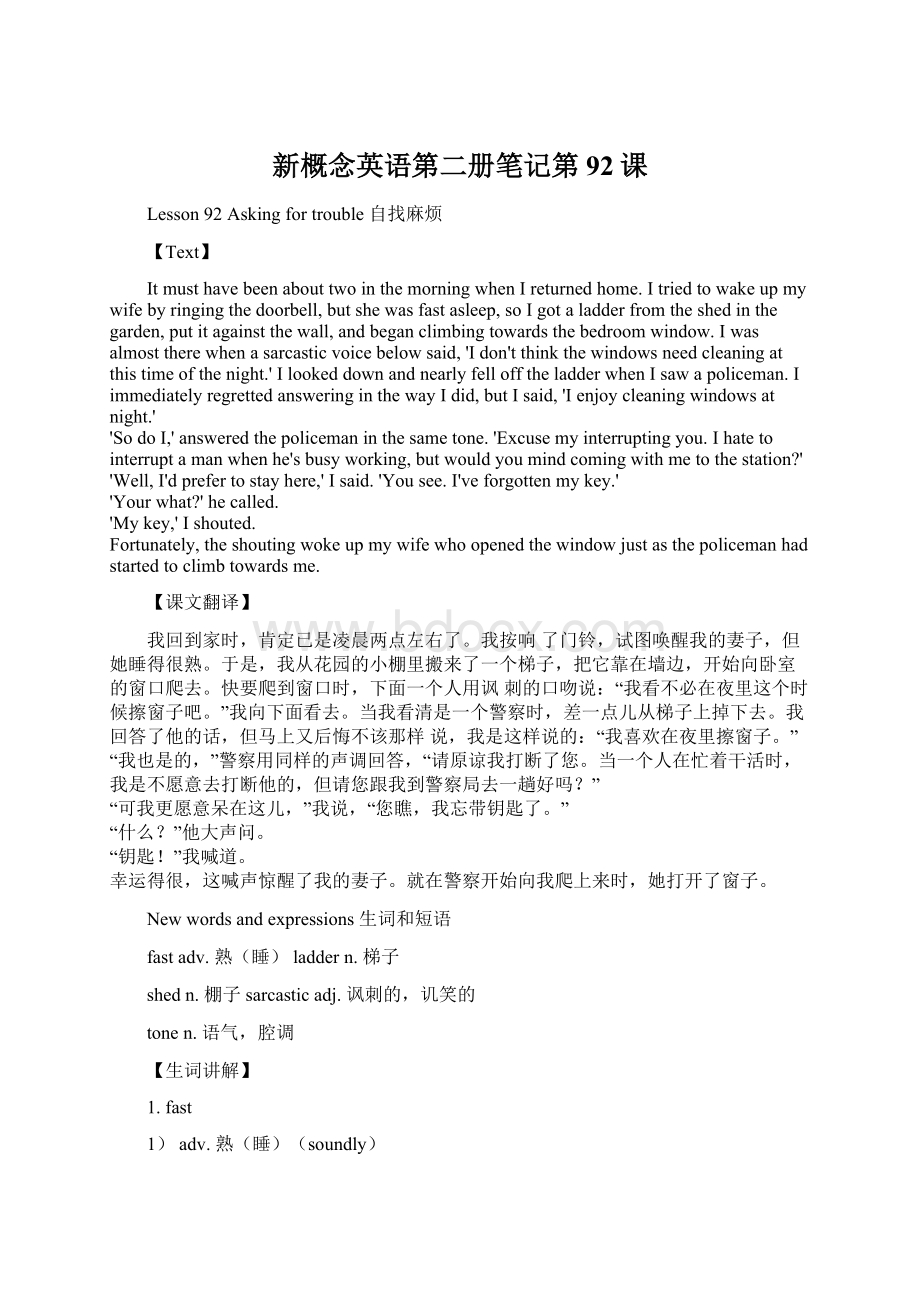新概念英语第二册笔记第92课.docx
《新概念英语第二册笔记第92课.docx》由会员分享,可在线阅读,更多相关《新概念英语第二册笔记第92课.docx(11页珍藏版)》请在冰豆网上搜索。

新概念英语第二册笔记第92课
Lesson92Askingfortrouble自找麻烦
【Text】
ItmusthavebeenabouttwointhemorningwhenIreturnedhome.Itriedtowakeupmywifebyringingthedoorbell,butshewasfastasleep,soIgotaladderfromtheshedinthegarden,putitagainstthewall,andbeganclimbingtowardsthebedroomwindow.Iwasalmosttherewhenasarcasticvoicebelowsaid,'Idon'tthinkthewindowsneedcleaningatthistimeofthenight.'IlookeddownandnearlyfellofftheladderwhenIsawapoliceman.IimmediatelyregrettedansweringinthewayIdid,butIsaid,'Ienjoycleaningwindowsatnight.'
'SodoI,'answeredthepolicemaninthesametone.'Excusemyinterruptingyou.Ihatetointerruptamanwhenhe'sbusyworking,butwouldyoumindcomingwithmetothestation?
'
'Well,I'dprefertostayhere,'Isaid.'Yousee.I'veforgottenmykey.'
'Yourwhat?
'hecalled.
'Mykey,'Ishouted.
Fortunately,theshoutingwokeupmywifewhoopenedthewindowjustasthepolicemanhadstartedtoclimbtowardsme.
【课文翻译】
我回到家时,肯定已是凌晨两点左右了。
我按响了门铃,试图唤醒我的妻子,但她睡得很熟。
于是,我从花园的小棚里搬来了一个梯子,把它靠在墙边,开始向卧室的窗口爬去。
快要爬到窗口时,下面一个人用讽刺的口吻说:
“我看不必在夜里这个时候擦窗子吧。
”我向下面看去。
当我看清是一个警察时,差一点儿从梯子上掉下去。
我回答了他的话,但马上又后悔不该那样说,我是这样说的:
“我喜欢在夜里擦窗子。
”
“我也是的,”警察用同样的声调回答,“请原谅我打断了您。
当一个人在忙着干活时,我是不愿意去打断他的,但请您跟我到警察局去一趟好吗?
”
“可我更愿意呆在这儿,”我说,“您瞧,我忘带钥匙了。
”
“什么?
”他大声问。
“钥匙!
”我喊道。
幸运得很,这喊声惊醒了我的妻子。
就在警察开始向我爬上来时,她打开了窗子。
Newwordsandexpressions生词和短语
fastadv.熟(睡)laddern.梯子
shedn.棚子sarcasticadj.讽刺的,讥笑的
tonen.语气,腔调
【生词讲解】
1.fast
1)adv.熟(睡)(soundly)
eg:
Heisfastasleep.=Heissleepingsoundly.
=Heissleepingdeeply.他睡得很熟.
2)快(rapidly[ˈræpidli]ad.迅速地)
eg:
Airplanescangomuchfasterthantrains.
飞机远比火车快。
eg:
Herantoschoolfast.
他飞快地跑到学校。
2.ladder
1)n.梯子
putupaladderagainstatree请把梯子靠树放
=setupaladderagainstatree
climbupaladder爬上梯子←→climbdownaladder爬下梯子
eg:
Walkingunderaladderisconsideredbadluck.
从梯子下面走过会带来厄运。
2)(发迹、成功于)阶段、手段
theladdertosuccess=theladderofsuccess成功的阶梯
climbupthesocialladder踏上发迹之途
knockdowntheladder=knockawaytheladder过河拆桥
3.shed
1)n.棚子、小屋、存放地
acattleshed牛棚;awoodshed木棚子
2)v.滴、掉落shed–shed–shed
eg:
Sheshedtearswhensheheardthenewsofhisdeath.
当她听到他死亡的消息她就流泪了。
3)v.落叶、脱毛
shedleaves落叶;shedskin脱皮
4)v.散发(光、热、香气等),放射、带来
eg:
Thegirlshedhappinessonpeoplearoundher.这女孩给身边的人带来快乐。
4.sarcasticadj.讽刺的,讥笑的
sarcasm [ˈsɑ:
kæzəm,ˈsɑr-]n.讽刺
irony [ˈaiərəni]n.反语,冷嘲;具有讽刺意味的事,嘲弄
与irony相比,sarcasm通常含有欲伤及对方的敌意
eg:
I'msickofyoursarcasticremarks.
我已经听腻了你的冷嘲热讽
eg:
Shetalkedwithhimwithsarcastictones.
她用挖苦的语调和他说话。
5.tone
1)n.语气,腔调
eg:
Shespokeinalowtone.
她用低沉的口气说话。
eg:
Shespokeinanangrytone.
她用恼怒的口气说话。
eg:
Thepolicemanansweredinasarcastictone.
警察用讽刺的口吻回答。
eg:
Thewaitergreetedusinafriendlytone.
那侍者用友好的口气同我们打招呼。
eg:
Hedescribedthenewbuildingintonesofdisapproval.
他以不以为然的语气描述那座建筑物。
2)音色、音调,声调
thesweettone(s)ofaclarinet单簧管的甜美音色
eg:
Youshouldusetherising/fallingtoneattheendofthissentence.
在这句话的结尾你应该用升调/降调。
3)色调、浓淡
eg:
Themountainswereinseveraltonesofgreen.
群山呈现出各种色调的绿色。
4)格调,风格,气氛:
eg:
Herdresshasabrighttone.
她的衣服格调明快。
eg:
Thebuildinghasaforeigntone.
这座建筑物有一种异国情调。
【课文讲解】
1.Askingfortrouble自找麻烦
maketrouble闹事,捣乱、惹麻烦
takethetroubletodosth费力做某事,不辞劳苦做某事
getintotrouble陷入困境,惹上麻烦
havetroublewithsb与某人有矛盾
eg:
Youshouldn'thavebeensorudetoher.Youareaskingfortrouble.
你不该对她那么粗鲁。
你这是自找麻烦。
eg:
Thebossseemstobeannoyed.Totalktohimnowistoaskfortrouble.
老板似乎在生气。
现在找他谈话是自讨苦吃。
eg:
Youaskedforit.
你自找的。
2.ItmusthavebeenabouttwointhemorningwhenIreturnedhome.
※musthavedone对发生完得事的一种比较肯定的判断
must+have+过去分词表示对过去发生的事进行推测(其否定式为can't+have+过去分词,cf.第17课语法);need+have+过去分词表示过去不必做但实际已做了的事(cf.第41课语法);should/oughtto+have+过去分词表示本来应该做而实际未做的事(cf.第65课语法):
eg:
Hehadfoundfiveemptywhiskybottleswhichtheghostmusthavedrunkthenightbefore.
他发现了5只空的威士忌酒瓶子,这肯定是鬼魂前天晚上喝的。
eg:
Theexaminermusthavebeenpleasedwithmyperformance.
主考人对我的表现想必是满意的。
eg:
Youneedn'thavesaidthat.
你没必要这么说。
(实际已经说了)
eg:
Youneedn'thavetoldhimaboutmyplans.
你本不必把我的打算告诉他。
(实际上已告诉了他)
eg:
Heshouldhavegonealongasidestreet.
他应该走一条小街。
(实际上他走了主要街道)
3.Itriedtowakeupmywifebyringingthedoorbell,butshewasfastasleep,soIgotaladderfromtheshedinthegarden,putitagainstthewall,andbeganclimbingtowardsthebedroomwindow.
※trytodosth尽力做某事
※(主动):
wakesbup=wakeupsb=awakesb叫醒某人
(被动):
sbbewokenup某人被叫醒
1)wakeup唤醒或吵醒某人
eg:
Stopshoutingoryou'llwakeuptheneighbors.
不要喊了,否则你会把邻居吵醒的。
2)清醒,警觉
eg:
Acoldshowerwillsoonwakeyouup.
你洗个冷水澡,马上就清醒了。
wakeupto觉醒
eg:
Atlasttheywokeuptotheseriousnessofthesituation.
最后他们才发觉事态严重。
3)醒来
eg:
Whattimedidyouusuallywakeupinthemorning?
你平常早晨通常几点钟醒来?
※fastasleep/soundasleep熟睡
eg:
Heseemstobefastasleep.
他好像睡得很熟。
beawake清醒
※ringthedoorbell按响门铃
※bedroom卧室
sitting-room=living-room客厅bathroom浴室
4)against
(1)违反,与.......相反,反对
eg:
That'sagainstthelaw.
那是违法的.
(2)倚;靠
eg:
Hisdeskisagainstthewall.
他的办公桌靠墙放着。
4.Iwasalmosttherewhenasarcasticvoicebelowsaid,'Idon'tthinkthewindowsneedcleaningatthistimeofthenight.
※有些动词如think,believe,expect,suppose等后面跟表示否定意思的宾语从句时,否定词not往往用在主句中,但译成汉语时否定意义应在宾语从句中。
我们一般不说IthinkMarywon'tcomethisevening,
而说Idon'tthinkMarywillcomethisevening。
又如:
Idon'tbelieveheisstillinLondon.
我相信他已不在伦敦。
※needdoingsth需要做某事、被需要做某事
wantdoingsth想做,想要
eg:
Theclassroomneedscleaning.(=needstobecleaned)
教室需要打扫.
eg:
Theshirtneedsironing.
这件衬衫需要熨烫
※atthistimeofthenight夜里这个时候
5.'IlookeddownandnearlyfellofftheladderwhenIsawapoliceman.IimmediatelyregrettedansweringinthewayIdid,butIsaid,'Ienjoycleaningwindowsatnight.'
※regret后面接动名词形式与接不定式的含义不同。
接动名词形式表示对做过的事感到后悔,接不定式则表示对现在或将来发生的事感到遗憾或抱歉
regretdoingsth后悔做过某事
regrettodosth遗憾(要)做某事
eg:
Iregrettedsayingitalmostatonce.
我几乎马上就后悔说了这话。
eg:
Weregrettotellyouthatyouarenotwelcome.
我们很遗憾地告诉您,您不受欢迎。
eg:
Weregrettoinformyouthatyouneedn'tcomeherenextweek.
我们很遗憾地通知你下周不用来这儿了。
与regret相似,remember,forget,stop等动词后面接不定式与接动名词形式的意义有很大不同。
remember/forget+不定式指未来的动作(或从过去观点看的“未来的”举动):
eg:
Remembertoposttheletters.
要记着/别忘记去邮信。
eg:
Irememberedtoposttheletters.
我记着去邮信了。
(没有忘记)
eg:
Don'tforgettoaskTom.
别忘记去问汤姆。
eg:
IforgottoaskTom.
我忘了去问汤姆。
remember/forget+动名词形式则指过去的动作(已发生过):
eg:
Irememberposting/havingpostedtheletters.
我记得已把信寄了。
eg:
Haveyouforgottenmeeting/havingmetherataparty?
你忘记了曾在一次聚会上见过她吗?
stop+不定式指目的:
eg:
OnthewaytothestationIstoppedtobuyapaper.
去车站的路上,我停下来买了一张报纸。
stop+动名词形式表示停下正在做的动作:
eg:
Whenhetoldusthestory,wejustcouldn'tstoplaughing.
他给我们讲故事时我们不禁都笑个不停。
※Idid为定语从句,修饰theway
※enjoydoingsth喜欢做某事
eg:
Ienjoysittinginaboatanddoingnothingatall.
我喜欢坐在船上,做么也不做。
6.'SodoI,'answeredthepolicemaninthesametone.
'Excusemyinterruptingyou.Ihatetointerruptamanwhenhe'sbusyworking,butwouldyoumindcomingwithmetothestation?
'
※用于并列补充句和反应句的so与neither/nor
so和neither/nor用于并列补充句和表示反应的句子时表示“也”、“同样”,so用于肯定句,neither/nor用于否定句(neither和nor完全可以互换)。
它们后面跟的是省略形式的分句,只有助动词+主语,也可以是情态助动词+主语:
eg:
JohncanspeakFrenchandsocanI.
Johncan'tspeakFrenchandneither/norcanI.
约翰会说法语,我也会。
(重复情态助动词)
约翰不会说法语,我也不会。
eg:
Iwenttoameetinglastnight.
SodidI.
昨晚我参加了一个会议。
我也一样。
(原句没有助动词时用/等)
eg:
Ididn'tgottothemeetinglastnight.
Neither/NordidI.
昨晚我没去参加那个会议。
我也没去。
eg:
I'vegotanewcarandsohasJohn.
我买了一辆新车,约翰也买了一辆。
(重复助动词have)
eg:
She'sgoingtohelpusandsoisJim.
她将帮助我们,吉姆也将帮助我们。
(重复助动词is)
eg:
HelikeshisbeerandsodoesFrank.
他喜欢啤酒,弗兰克也喜欢。
(加助动词does)
※excuse原谅
excusesbfordoingsth=excuseone’sdoingsth原谅某人做某事
eg:
Sheexcusedhimforbeinglate.她原谅了他迟到。
=Sheexcusedhisbeinglate.
※hatetodo=hatedoing不喜欢做
hatetodo表目前这次不想做某事
hatedoing不喜欢做某事、是一直的喜好
eg:
Ihatetodisturbyou,butmayIcomein?
我不想打扰你,但我可以进来吗?
eg:
Ihatedisturbingpeoplewhentheyarebusy.
我不喜欢在人家忙时打扰他人。
hatetodo/hatedoing不愿意……、不想做
eg:
Ihatetosayit,butyouaremistaken.
我不想这么说,但你弄错了。
※bebusydoing忙于做某事
※wouldyouminddoingsth你是否介意做某事
wouldyoumindone’sdoingsth你介意某人做某事吗?
eg:
Wouldyoumindopeningthewindow?
=Wouldyoumindmyopeningthewindow?
你介意我开窗吗?
7.'Well,I'dprefertostayhere,'
※prefertodo更愿意做某事
prefertogothemovies更喜欢看电影。
prefernottodo更(不)喜欢做sth
eg:
I’dprefernottogothere.
我宁可不要去那里。
prefertodo+ratherthan(to)do宁愿作某事,而不愿作某事
eg:
Iprefertogotothemoviesratherthan(to)stayhome.
eg:
Iprefergoingtothemoviestostayinghome.
我宁愿去看电影,也不愿意待在家里。
prefer+sb+todosth更喜欢某事/某人/做某事
eg:
Theypreferredtheirsontogotocollege.
他们宁愿儿子去上大学。
8.Isaid.'Yousee.I'veforgottenmykey.'
'Yourwhat?
'hecalled.'Mykey,'Ishouted.
Fortunately,theshoutingwokeupmywifewhoopenedthewindowjustasthepolicemanhadstartedtoclimbtowardsme.
※whoopenedthewindow为定语从句,修饰mywife
6.enjoycleaning
7.excusemyinterruptingyou
8.hatetodosth
9.wouldyouminddoingsth
10.
【关键词组摘录】
1.returnhome
2.trytowakeup
3.fastasleep
4.regretdoingsth
5.prefertodosth
【Keystructures】
v-ing(参见KS20,44,68)在句中做主语、宾语、表语、定语
eg:
Eatingisalwaysapleasure.吃总是一种享受。
eg:
Hisjobiskeepingthehallclean.他的工作是保持大厅干净
eg:
Ihatetellinglies.我讨厌说谎。
aswimmingpool游泳池
Exsecises:
完成以下句子
Iamaccustomedto……我习惯了...
→Iamaccustomedtostayinguplate.
Fancy…….想象
→Fancymeetingyouhere!
Ialwaysavoid……我总是避免.